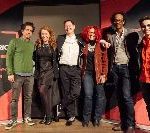“Vice is punished, but virtue is not rewarded”
―
George Orwell,
Inside the Whale and Other Essays
“Every novel says to the reader: “Things are not as simple as you
think.” That is the novel’s eternal truth, but it grows steadily harder
to hear amid the din of easy, quick answers that come faster than the
question and block it off. In the spirit of our time, it’s either Anna
or Karenin who is right, and the ancient wisdom of Cervantes, telling us
about the difficulty of knowing and the elusiveness of truth, seems
cumbersome and useless.”
―
Milan Kundera,
The Art of the Novel
Reprisals are daily sorrows, daily sad persons are found in ditches of a morning and no matter what allegiance was in their hearts at any daybreak. Because they are broken, bloody, vanished hearts, auxiliary and guerrilla alike.
Do Shy People Make the Best Writers?
Writing with this goal in mind is a gamble. It may entail years of self-imposed solitude, so that what was intended as a cure for shyness only ends up aggravating it. Shy writers, far from being timid, are actually taking a big risk: the risk that their writing might, if they are lucky, speak to someone else in some long-deferred future.
But there is something very human about that. We are not the only animals to be sociable and communicative. Whales, dolphins, birds, and other creatures have sophisticated languages that might seem even more so if we could just decipher them. But we are the only animals to turn our communicative instincts into substitute forms. We alone leave marks that can be read when we are not there, perhaps even when we are no longer alive. Writing is the answer that evolution has devised for the problem of human loneliness. No wonder shy people are drawn to it. And yes, that goes for the writer who wrote what you have just been reading.
Why are shy people such as E.B. White, J.K. Rowling, and Joan Didion drawn to writing as a career? Are shy authors more likely to grasp ‘the nature and beauty of brevity’?
Understanding the drivers of persuasion and other influence techniques
Actress and activist Emma Watson loves books and reading so much, she’s willing to stand up for spreading the word. While being interviewed for a Vanity Fair cover story, Watson dragged her interviewer, journalist Derek Blasberg, around the New York…Continue Reading →
I got the idea for the spontaneous style of On the Road from seeing how good old Neal Cassady wrote his letters to me, all first person, fast, mad, confessional, completely serious, all detailed, with real names in his case, however (being letters). I remembered also Goethe’s admonition, well Goethe’s prophecy that the future literature of the West would be confessional in nature; also Dostoyevsky prophesied as much and might have started in on that if he’d lived long enough to do his projected masterwork, The Life of a Great Sinner. Cassady also began his early youthful writing with attempts at slow, painstaking, and all-that-crap craft business, but got sick of it like I did, seeing it wasn’t getting out his guts and heart the way it felt coming out.
No. 5: The richness of life reveals itself through a richness of gestures. One must learn to feel everything — the length and retarding of sentences, interpunctuations, the choice of words, the pausing, the sequence of arguments — like gestures.
...
Nietzsche created, so to speak, a new style in philosophical writing, which up until then was couched in academic tones or in effusive poetry: he created a personalized style; Nietzsche not only mastered language but also transcended its inadequacies. What had been mute, achieved great resonance.
And one more: “Good writers have two things in common: they prefer to be understood rather than admired; and they do not write for knowing and over-acute readers.”
– Friedrich Nietzsche

Simon Reichley tells the odd story of The Book Beat in Oak Park, how its Facebook page and all the content on it disappeared without warning, and how the page was restored.

One thing would be not to pretend that everything was perfect before. “Ms. Eltahawy expressed exasperation at the end over the number of people during the event, most of them white, who made claims of exhaustion and asked the panelists for advice on how to keep up unflagging opposition. Ms. Eltahawy suggested in the firm tone that she used all night that those people realize how privileged they have been to have not felt besieged by politics before now.”
J. CHRISTIAN ADAMS: Federal Judge Blasts Unprofessional Behavior of Justice Department Lawyers: “Another federal judge has scalded the unprofessional conduct of Justice Department lawyers inside the Civil Rights Division. The first time it was perjury. After that, it was unethical conduct in a trial against New Orleans police officers. Now it’s unprofessional behavior and bigotry toward the South in a federal court trial challenging Texas legislative districts.”
5 tips for writing blog posts
"Truth is no longer dictated by
authorities, but is networked by peers. For every fact there is a counterfact.
All those counterfacts and facts look identical online, which is confusing to
most people." — Richard Gray, writing for BBC Future
Nah, trust us, there is something to this
By John Helmer, the longest continuously serving foreign correspondent in Russia, and the only western journalist to direct his own bureau independent of single national or commercial ties. Helmer has also been a professor of political science, and an advisor to government heads in Greece, the United States, and Asia. He is the first and only member of a US presidential administration (Jimmy Carter) to establish himself in Russia. Originally published at Dances with Bears
Even when it's eventually corrected,
misinformation does unfortunate things to the veracity of your memory, especially
when that bad information comes from social sites like Facebook. The journal Nature explains why it's difficult to erase
erroneous memories.
Wondering if the crowd size is really that big? This very
intuitive tool will help you measure whether the space
can actually fit the number of people claimed. (h/t Libération's article on Fillon's Trocadero crowd)
Start with the truth, says Harvard's Judith
Donath, and don't repeat the lie. And, she adds, "Use vivid graphics that
depict reality." See the examples
A new program through Chicas Poderosas (Powerful Girls) helps
young women find and investigate news stories, while teaching them
fact-checking skills to make their work "irrefutable."
The International Symposium on Journalism will
hold a hackathon next month to improve accountability
journalism. ... The Craig Newmark Foundation is funding "TruthBuzz: The Viral Fact-Checking
Contest" to find a way to distribute fact-checking more widely.
What happens when Climate Feedback fact-checks
articles by annotating them? One author appreciated being subjected to that kind of
scrutiny. Another publication updated its work slightly.
(1) We can't get enough of UNO and Chequeado's fact-checking GIFs. (2) CrossCheck is now live. (3) Facebook announced the expansion of its flagging tool
to France. (4) Speaking of Facebook, here's a step-by-step guide to using the new
"disputed news" flag. (5) ICYMI, because it is still very much out
there, the "backfire effect" is not as strong as we thought. (6)
"Verify Road Trip," a Dallas TV station's effort to bring viewers
along on fact-checking trips, is a finalist in the Scripps Howard
Awards. (7) Maybe Google Home needs to go to journalism
school? (8) Fake news has a cameo appearance on "The Good Fight." (9) Today's
massive flow of news has "a paralyzing effect" that allows fake news
to take hold, says a McGill professor. (10)
Fact-checking can sound "sanctimonious" at times and that's
a problem, says an American University professor. (11) File under unusual
responses to a fact-checking inquiry: "Sorry, we’re in
combat. Can you call us back later?”


